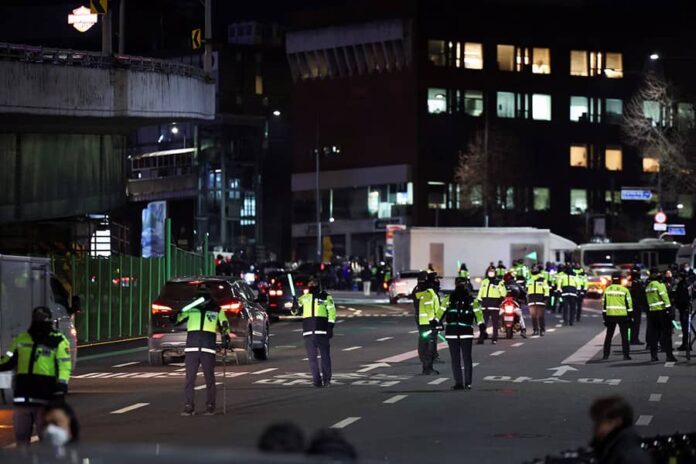Police cars were spotted outside Yoon’s home in Seoul as investigators called off a lengthy attempt to apprehend South Korea’s impeached President Yoon Suk Yeol on Friday. Local news outlets reported that this decision came after thousands of the president’s supporters gathered outside his residence.
There were both police vehicles and large crowds of his backers present, with some protesters even lying down in front of law enforcement to block access to the property.
It was confirmed that anti-corruption officials made their way onto Yoon’s property, leading to a standoff between his security team and police. Around 2,800 officers were dispatched to the scene, but after about five hours, investigators decided to withdraw their efforts.
The Corruption Investigation Office for High-ranking Officials stated, We concluded that carrying out the detention warrant was practically impossible due to ongoing confrontations and halted it for safety reasons concerning personnel at the scene.
They also mentioned they would review their next steps moving forward and expressed disappointment over Yoon’s refusal to comply with legal procedures.
The attempt to detain him followed a South Korean court issuing an arrest and search warrant on December 30 related to his brief declaration of martial law.
This warrant is valid until January 6, which means investigators will need to try again by Monday if they want another shot at detaining him. According to South Korea’s constitution, if a sitting president faces insurrection charges, police can arrest him while he’s still in office.
A joint investigation team sought this warrant after claiming Yoon ignored three requests for questioning regarding insurrection and abuse of power allegations. This marked a historic first—an arrest warrant issued against a sitting president in South Korea. Following the request for the warrant, Yoon’s lawyers appealed for its dismissal, arguing that the court lacked authority over insurrection investigations and asserting that his martial law declaration was constitutional.
Yoon announced martial law during a televised address on December 3rd, citing it as necessary due to actions by the opposition party—the Democratic Party—which he accused of controlling parliament and sympathizing with North Korea while stalling government functions.
This declaration led to protests; just hours later, the National Assembly voted overwhelmingly—190 out of 300 members—to demand that he lift the martial law order as required by South Korean law.

After the National Assembly cast their votes, Yoon announced that he had pulled back the troops that were sent to enforce martial law and stated, We’ll lift martial law as soon as we have enough cabinet members present. The State Council then gathered to officially vote on lifting it.
Meanwhile, the Democratic Party of the country urged Yoon to step down, labeling his declaration of martial law as fundamentally invalid. Since Yoon hasn’t resigned, the opposition party has been pushing forward with impeachment proceedings against him.
He’s been suspended from his role since December 14 when the National Assembly voted overwhelmingly in favor of impeachment with a tally of 204-85.
